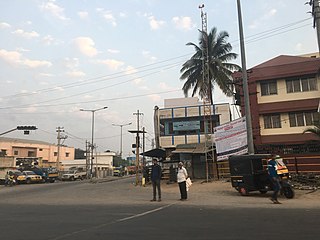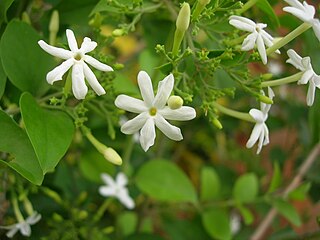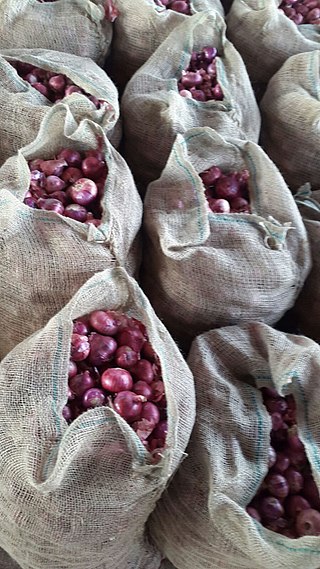
Sirsi is a city in Uttara Kannada district of Karnataka state in India. It was also known as Kalyana Pattana during the Sonda Dynasty. It is a tourist destination with evergreen forest and waterfalls and is also a commercial centre. The main businesses around the city are mostly subsistence and agriculture-based. Areca nut or betel nut, locally known as Adike, is the primary crop grown in the nearby villages, making it one of the major trading centres for areca nut. The region is also known for spices such as cardamom, pepper, betel leaves, and vanilla. The major food crop is paddy.

Channapatana is a city and taluk headquarters in Ramanagara District, Karnataka, India. Channapatna is approximately 60kms from Bangalore and 80kms from Mysore. The Kannadiga film actor Kishore was born here in 1974.
Doddaballapura is a City in Bangalore Rural district in the state of Karnataka, India. Dodda means "big" in the native Kannada. it is an industrial city which houses several multiple national companies it lies 40 km away from Banglore.

Byadagi chilli is a variety of chilli mainly grown in the Indian state of Karnataka. It is named after the town of Byadgi which is located in the Haveri district of Karnataka. It is sometimes written as Bedgi in some super markets and grocery stores in India. The business involving Byadagi chillis has the second largest turnover among all chilli varieties of India. An oil, oleoresin, extracted from these chillies is used in the preparation of nail polish and lipstick. Byadagi chilli is also known for its deep red colour and is less spicy and is used in many food preparations of South India. Byadagi chilli has been accorded Geographical Indication (GI) in February 2011. Its GI tag is 129.
Mysore Sandal Soap is a brand of soap manufactured by the Karnataka Soaps and Detergents Limited (KSDL), a company owned by the government of Karnataka in India. This soap has been manufactured since 1916, when Krishna Raja Wadiyar IV, the king of Mysore, set up the Government Soap Factory in Bangalore. The main motivation for setting up the factory was the excessive sandalwood reserves that the Mysore Kingdom had, which could not be exported to Europe because of the First World War. In 1980, KSDL was incorporated as a company by merging the Government Soap Factory with the sandalwood oil factories at Shimoga and Mysore. Mysore Sandal Soap is the only soap in the world made from 100% pure sandalwood oil. KSDL owns a proprietary geographical indication tag on the soap, which gives it intellectual property rights to use the brand name, to ensure quality, and to prevent piracy and unauthorised use by other manufacturers. In 2006, Mahendra Singh Dhoni, the Indian cricketer was selected as the first brand ambassador of the Mysore Sandal Soap.

Chikkaballapura district is a district in the state of Karnataka, India. On 23 August 2007, it was carved out of the pre-existing Kolar district which was the fourth largest district of Karnataka by moving the talukas of Gauribidanur, Gudibanda, Bagepalli, Chikballapur, Manchenahalli, Sidlaghatta and Chintamani into the new district. Kannada is the official language.

The modern Indian Wine market is small but growing; annual per capita consumption of wine in the country is a mere 9 milliliters, approximately 1/8000th that of France. The main reason for this can be attributed to the fact that Indians preference for hard liquor and beer boasts nearly 98% of market share whereas wine with low ABV only has 2% market share. The viticulture in India has a long history dating back to the time of the Indus Valley civilization when grapevines were believed to have been introduced from Persia. Winemaking has existed throughout most of India's history but was particularly encouraged during the time of the Portuguese and British colonization of the subcontinent. The end of the 19th century saw the phylloxera louse take its toll on the Indian wine industry followed by religious and public opinion moving towards the prohibition. Following the country's independence from the British Empire, the government encouraged vineyards to convert to table grape and raisin production. In the 1980s and 1990s, a revival in the Indian wine industry took place as international influences and the growing middle class started increasing demand for the beverage. By the turn of the 21st century, demand was increasing at a rate of 20-30% a year. The city of Nashik in the state of Maharashtra is called the "Wine Capital of India."

Banganapalle mangoes is a mango variety produced in Banganapalle of Nandyal District in the Indian state of Andhra Pradesh. It alone occupies 70% percent of total mango cultivable area of the state and was first introduced by the Farmers of Banaganapalli. It was registered as one of the geographical indication from Andhra Pradesh on 3 May 2017, under horticultural products by Geographical Indication Registry. It is also grown in the other parts of India and Pakistan. The fruit is described as obliquely oval in shape, around 20cm in length, with yellow flesh and a thin, smooth yellow skin. The flesh is of a firm, meaty texture and is sweet and lacks fibre. The cultivar is the most sought after in Andhra Pradesh. It is a very late -season variety that is good for canning. This cultivar is a source of vitamin A & C and is also called king of Mangoes.

Jasmine is considered the queen of flowers and is called the "Belle of India" or the "Queen of fragrance" as it is exquisitely scented to soothe and refresh. In different parts of India it is called by different names—Mogra, Motia, Chameli, Malli puvvu, Jaati, Mulla, Mallige, Juhi, Mogra or Moonlight in the grove. It is reported that there are 300 varieties of jasmine. It is also stated that jasmine crossed the seas—from Asia to Europe, landing first along the Mediterranean Sea, conquering Greece and Turkey, reaching Western Europe through Spain, then France and Italy and finally landing in England in the latter part of the 17th century..

Horticultural Producers' Cooperative Marketing and Processing Society, popularly known by its acronym, HOPCOMS, is a farmers' society founded in 1965 for the direct marketing of farm produces. The society is headquartered in Lalbagh, Bengaluru, in the south Indian state of Karnataka and its activities are spread in the districts of Bangalore Urban, Bangalore Rural, Kolar, Ramanagar, Mandya, Mysuru and Chikkaballapura.

Bengaluru North University (BNU) is a state university located in Tamaka, near NH 75 in Kolar, Karnataka, India. The university was established in 2017 by the Government of Karnataka through the Karnataka State Universities (Amendment) Act, 2015 trifurcating Bangalore University by creating Bengaluru North University and Bengaluru Central University.

Udupi Mattu Gulla, or Udupi Matti Gulla, is a variety of green brinjal grown in and around the village of Matti in Udupi, India. It was given the Geographical Indication tag in 2011.

Coorg orange, also called Coorg mandarin, is a cultivar of orange from Kodagu in Karnataka. It was given the Geographical Indication status in 2006.

Bangalore rose onion, locally called gulabi eerulli, is a variety of onion grown in and around Bangalore in Karnataka. It got the Geographical Indication tag in 2015.

Mysore betel leaf is a variety of heart shaped betel leaf grown in and around the region of Mysore. It is consumed as a betel quid or as paan, with or without tobacco. A sheaf of betel leaves is traditionally offered as a mark of respect and auspicious beginnings. Areca nut are kept on top of the sheaf of betel leaves and offered to the elders for their blessings and during wedding ceremonies.

The Nanjangud banana, natively called as Nanjangud rasabalehannu, is a variety of banana grown in and around the area Mysore district and Chamarajanagar district of Karnataka, India. It is famous for its unique taste and aroma. It was found that the black clay alluvial saline soil found in and around Nanjangud drastically changed the taste and aroma, giving it a particular geographical identity, so it is now registered under geographical indicators under Government of India.

Mahabaleshwar strawberry is a strawberry grown in the hilly slopes of Mahabaleshwar, which accounts for about 85 percent of the total strawberry produced in India. Strawberry, along with raspberry, mulberry and gooseberry, is produced on a large scale in and around Mahabaleshwar. Mahabaleshwar strawberry obtained the geographical indication (GI) tag in 2010.

The Devanahalli pomelo is a variety of the citrus fruit pomelo of the family Rutaceae. It is exclusively grown in the region around Devanahalli taluk, Bangalore Rural District, India, as an exotic crop variety. Its officially designated name is "Devanahalli Pomello (Chakkota)"; it is locally known as chakkota.
Kamalapur Red Banana is a special variety of Red banana which is exclusively grown in the valley of Kamalapur village and its surrounding areas in Kalaburagi district of Karnataka, India. It is known as a "rich man's fruit" as it is marketed at a higher price compared to other varieties of banana due to greater inputs in farming with fertilizer, water, and workforce. While its skin is red coloured, the pulp is creamish in colour with an enjoyable taste. It has a high calorie value with Vitamin C and B6, which makes it a health food.

Nashik valley wines are specially protected under the patent of the Geographical Indication in India for the region of Nashik district in Maharashtra, India, where it is produced from several vineyards and the Sula wine is one of the major producer of Wines in Nashik. The wine is produced in two types: red and white. The district has 52 wineries in operation and consequently Nashik is occasionally known by the epithet "The Wine Capital of India".

















